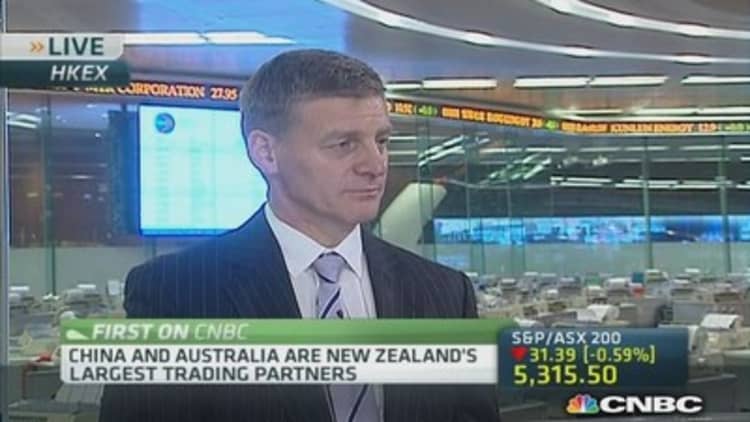
The Chinese economy will continue to face more volatility as the country wrestles with credit problems, says New Zealand's Finance Minister Bill English.
"There's clearly a will [in China] to allow some defaults to try and work through the credit build up," English told CNBC Asia's "Squawk Box" on Tuesday.
"As an economy selling into China, we're expecting more volatility in the economy in general, but still reasonably solid consumer demand," he added.
The stability of China's financial sector has been in focus in recent months after a near high-profile failure of a trust product, which was marketed by local lender ICBC, in January. Earlier this month, China experienced its first domestic bond default when Shanghai Chaori Solar Science & Technology Co was unable to make an 89 million yuan ($14.5 million) interest payment.
(Read more: What worries me most about China: Caterpillar CEO)
In addition, recent economic data has pointed to slowing growth momentum. This has raised speculation that authorities may provide monetary or fiscal stimulus to support growth.
"I think we've had an artificially smooth growth profile out of China because of the extent of their intervention. They can't keep doing that," said English.
China is New Zealand's biggest export destination, with dairy products accounting for roughly half of the $10 billion worth of goods the country dispatched to the mainland in 2013.
(Read more: WPP CEO: Look to China for leadership on technology)
Last week, China and New Zealand signed a currency deal to allow the direct conversion of the New Zealand dollar with the Chinese renminbi or yuan. The deal aims to reduce costs for exporters and importers by removing the necessity for transactions to be settled in two foreign exchange trades via a third currency - typically the U.S. dollar.
"I think it's symbolic in the shorter-term because there's so little trade done on that cross trade. But in the long run, it signals where the world is going and where New Zealand's investment and trading interests are going," he said, referring to the currency deal.
English said the New Zealand dollar's value is "a bit high" and has put a lot of competitive pressure on the country's export sector.
The New Zealand dollar, also referred to as the kiwi, has emerged as a market darling in recent months. It has appreciated 4 percent so far this year to around 0.85 to the U.S. dollar, as investors turn increasingly upbeat on the outlook for New Zealand's economy.
New Zealand's central bank has taken the lead among developed economies in tightening monetary policy, raising interest rates earlier this month and signaling further rises through early 2017.
(Read more: New ZealandFinMin: Property prices a 'concern' but under control)
"There has been a bit of upward pressure on the kiwi with the interest rate increase," said English. "We thought most of that had been priced in. In the longer run, the U.S. economy is going to pick up. It should re-rate the U.S. dollar against the kiwi dollar."
—By CNBC's Ansuya Harjani; Follow her on Twitter @Ansuya_H


